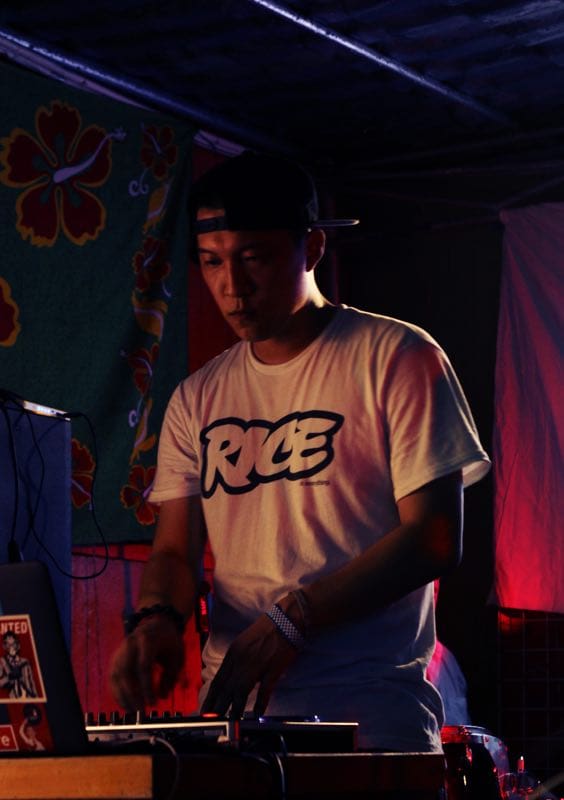
ShenZhen Music Scene: DJ Mefaun Rice
With a cigarette between his forefingers, his smartphone handily placed in front of him on the table and a Venti Starbucks coffee beside it confirming the scheduled meet up, Michael “Mefaun Rice” Hsu sat on the patio of the commercial cafe. His slicked back hair topped the trending all-black attire that donned him and the aura of smoke encircling him matched the chilled yet artistically crafted atmosphere of the OCT LOFT neighborhood in one of ShenZhen’s shore side districts. Mefaun Rice is a DJ with an unconventional style that is trying to influence, introduce, and represent hip-hop in the South China city.
After being in ShenZhen for a couple of years, I’ve noticed the young city quickly transform from old to new, new to newer, and continue on despite the 2015 financial crisis the whole country faced. And even though the middle-aged city has garnered much attention from outsiders who frequently compare it to Silicon Valley because of its tech industry, it has yet to establish it’s own musical roots in the world.
Columnist Fiona Tam of the South China Morning Post reported on the premier city as a comparatively open market for foreign musicians with new and alternative sounds. One of her sources, musician Takuro Mizuta said that “Audiences are generally more open-minded and enthusiastic about new experiences. There is a sense of opportunity to do something new here.”
With Katura’s statement in mind and out of sheer curiosity, I wanted to learn more about Shenzhen’s music scene (particularly hip-hop) and how expats/lifers like DJ Mefaun Rice are interpreting this musical opportunity and catering to the audience.
“Shenzhen is a migrant city – people come and people go. There really isn’t a solid foundation or even a solid platform,” Hsu states. He was born in Fairfax, VA, raised in Seattle and has been residing with his father in ShenZhen for about eight years. Hsu became a resident DJ in 2008 at the now defunct INClub in Luohu district. Since then, he has moved around to other clubs, some bars, and played local festivals within the city giving him a decent insight into what is happening.
“…Compared to other scenes [like] Beijing, Shanghai, Guangzhou like they have their own hip-hop scenes that have been developed for quite awhile,” he continued.
Mefaun Rice is correct. Beijing-based rap group Yin Ts’ang and DJ Wordy graced the pages (and webpages) of the New York Times over five years ago. Chengdu has birthed popular rappers like Melo and Fat Shady who play up trap beats and rhythms in their tracks. Many more MC’s, rappers, DJ’s, and singers representing the current wave of Hip-Hop and it’s reach in Mainland cities like Guangzhou, Shanghai, Changsha, Hunan, and Nanjing can be seen on Zhong.TV’s YouTube channel. Even though, Shenzhen’s local rappers like JR Fog and expat-rappers like the one’s that mostly make up Shady Monkey happily showcase the thriving city in their lyrics and in their music videos to an older-styled flow, it is still too early to know what the 38-year-old city will be known for.
It’s not only time that makes this unpredictable, it’s also cultural acceptance.
“Chinese folks love Kpop… There’s a lot of Kpop and things like that, so that’s a major influence,” he said.
Much of Hip-Hop in China is still underground due to governmental restrictions on lyrical content and what is seen publicly is pop versions of the art form that boybands and pop idols ride on to glory and fame like EXO-M (the Mandarin subgroup of South Korea’s boyband EXO). If you walk the streets at night in CoCo Park (in FuTian district) or Sea World (in SheKou), you tend to hear Billboard toppers like you would in any other major city.
However, Hsu desires to see “ShenZhen have its own specialty.” He explained that generally people come to China with expectations and question whether hip-hop is going in the right direction.
“You kind of have to let China do its own thing,” he stated, “We can’t have our own biases towards what’s going on out here because it is its own market.”
Hsu said China’s hip-hop scene has the right approach and what people have learned and built upon is “cool” – they just need to see a broader spectrum of the culture. The DJ acts on this by not only “bringing what’s new in the states and immediately trying to influence it out here (in China),” but he also spins various periods of hip-hop (like New Jack Swing and Chicago Juke) with low-fi instrumentals and jazz hip-hop. Basically, hip-hop you can occasionally dance to, but ultimately chill to… or trip to (a friend of mine added while watching one of his sets at the wine bar called MAGMA in BaiShiZhou).
DJ Mefaun Rice is going against the mainstream trend to expose people to what he likes.
“[Hip-Hop] is not just boom-bap – you can still chill out to it,” said the DJ. As Mefaun Rice sets out to educate locals and expatriates alike about hip-hop’s range while pursuing his musical dreams, my curiosity still remains. Will Shenzhen play up to mainstream beats behind Chinese and English lyrics or will the youthful natives of Shenzhen transform China’s hip-hop landscape with their cosmopolitan savvy?

